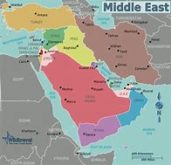rferl.org – Militias supported by Iran from across the Middle East, including groups from Iraq, Syria, Lebanon, and Palestinian factions, have been holding secret strategy sessions in Hizballah’s tunnels in southern Lebanon in recent weeks, according to information obtained by RFE/RL’s Radio Farda.
Sources affiliated with the militias told Radio Farda that the meetings were attended by representatives from various Iranian-backed groups, including Iraq’s Kata’ib Hizballah, Al-Nujaba, the Badr organization, and delegates from the Huthi movement in Yemen.
Among those who had been attending the meetings was Mohammad Reza
Zahedi, a high-ranking commander of the Islamic Revolutionary Guards
Corps’ Quds Force, who was killed on April 1 in a suspected Israeli
strike on the Iranian Embassy’s consular annex in Damascus, the sources
said.
Representatives from Hamas and Islamic Jihad, two groups designated as
terrorist organizations by the United States and the European Union,
attended the meetings as well, according to the sources.
The meetings come amid heightened tensions in the region as Israel and
Hamas fight a war sparked by Hamas’s October 7 raid into Israel that saw
some 1,200 people killed and 240 taken hostage and brought back to
Hamas by the extremists.
Since the war broke out, Iranian-backed militias have stepped up
retaliatory actions against Israeli interests as its incursion into Gaza
broadens, triggering concerns that the war will escalate and spread
across the region.
Hizballah has launched rocket and drone attacks into northern Israel,
leading to Israeli counterstrikes. The confrontations have resulted in
the deaths of more than 300 Hizballah fighters. Meanwhile, Iraqi
militias have carried out numerous rocket and drone attacks against U.S.
forces in Iraq and Syria.
Yemen’s Huthi rebels have also targeted commercial vessels in the Red
Sea that they believe to be connected with Israel or en route to Israeli
ports. These actions have drawn military responses from the United
States and the United Kingdom, while the European Union has deployed
forces to help safeguard maritime transport in the strategic waters.
Despite the widespread turmoil, Iran has denied any involvement in
orchestrating the attacks, asserting that the militias are independently
choosing their courses of action.
 Shabtabnews In this dark night, I have lost my way – Arise from a corner, oh you the star of guidance.
Shabtabnews In this dark night, I have lost my way – Arise from a corner, oh you the star of guidance.



